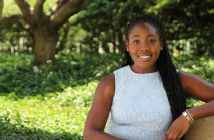The legal landscape in the United States is at an inflection point. At least, that is what New York State Senator Alessandra Biaggi ’12 believes. “This is the actual moment in which this new set of voices is going to change the whole landscape. Having women in the room, and women in leadership, is going to make our world more fair and equal.” Senator Biaggi made this observation in her keynote address at Fordham Law School’s third annual Women’s Leadership Institute, held on January 31, 2020.
Organized by alumnae Molly Ryan ’15, Hopi Costello Ruplin ’16, and Kara Krakower ’19, the institute is presented by the Feerick Center for Social Justice and the Stein Center for Law and Ethics, and sponsored by Kirkland & Ellis, Milbank, and Latham & Watkins. The daylong event included panels and talks directed at young female lawyers, with an aim to equip them with tools to harness their confidence and take risks to succeed. Krakower discussed the impetus for the event, noting, “They [Ryan and Costello Ruplin] started the event as a practical day to think about what leadership skills are not always marketed to women, especially to young women.”

“Practice of Law as a Business” Panelists (L–R): LeeAnn Black, Suzie Scanlon Rabinowitz ’95, and Yarelyn Mena ’19
Following a welcome address from Dean Matthew Diller, a panel entitled “Practice of Law as a Business” offered young attorneys different perspectives on how to navigate the process of establishing themselves and how to take advantage of connections and build their networks while launching their careers.

“Cultivating On-Ramps” Panelists (L–R): Lindsey Boyle, Carroll Welch, Geeta Tewari ’05, and Alex Berke ’14
The second panel, “Cultivating On-Ramps,” moderated by Geeta Tewari ’05, director of the Fordham Urban Law Center, focused specifically on women returning to the legal field after a hiatus to raise children or cafe for a family member. Because it is women who take these career breaks, they often experience discrimination in hiring and promoting practices. The panelists discussed networking opportunities and resources to address these challenges.
Tenacity was a recurring theme throughout the day. “It took me three tries to get into Fordham Law,” Biaggi told the attendees. She also admitted that she did not pass the bar on her first try. “All of those failures had just led me to the moment where I was not willing to give in, because of how hard it had been to reach that moment,” Biaggi said.
Nalini Saxena, the CEO and founder of Elicit Counseling, ran a session entitled “Disrupting Imposter Syndrome,” adding new insights to the phenomenon and how feelings of self-doubt and inadequacy can take hold for young lawyers, particularly in law firms. Not only does imposter syndrome disproportionately affect women and people of color, but it also has a higher prevalence in high-achieving individuals.
It is not enough to simply hire or promote women to leadership roles, Saxena highlighted. She introduced the concept of “second generation bias,” explaining, “Where women have been excluded in the past, there’s a new idea that we should be including more women. However, there are not enough role models for those women once they have been elevated.”
The session culminated in interactive discussion between attendees regarding their own experiences of imposter syndrome, and Saxena offered constructive tips for combating the phenomenon.

“Women Leaders in Law: Advice and Discussion” Panelists (L–R): Séverine Losembe ’15, Jennifer Jones Austin ’93, Susan Herman, and Lauren M. Colasacco ’10
In a panel entitled “Women Leaders in Law: Advice and Discussion,” prominent female lawyers offered their perspectives on building professional networks, navigating gender dynamics in the workplace, and cultivating an appropriate work-life balance.
A fireside chat between Justice Maria Araujo Kahn ’89 of the Supreme Court of Connecticut and Miyoshie Lamothe-Aime ’19, an associate at Fried Frank, concluded the program. Lamothe-Aime asked the judge to share her background and experiences as an immigrant and woman of color in the legal field.
“It’s very hard for women—and it’s even harder for women and lawyers of color—so, it’s important that when you have a measure of success, you pay it forward,” said Kahn. “It’s not an option—it’s an obligation.”
In addition to tenacity, the importance of networking was a prevalent theme throughout. “Always have a goal,” urged Kahn. “Always look for someone doing what you want to be doing, and connect with that person.”







